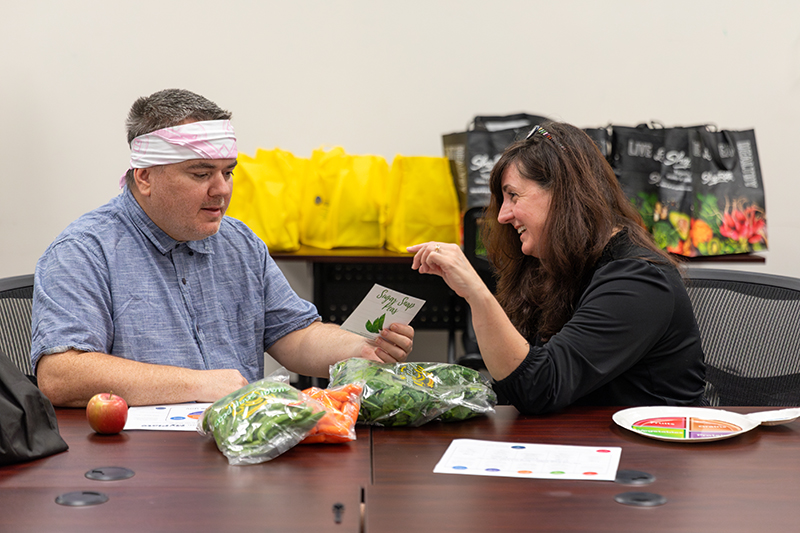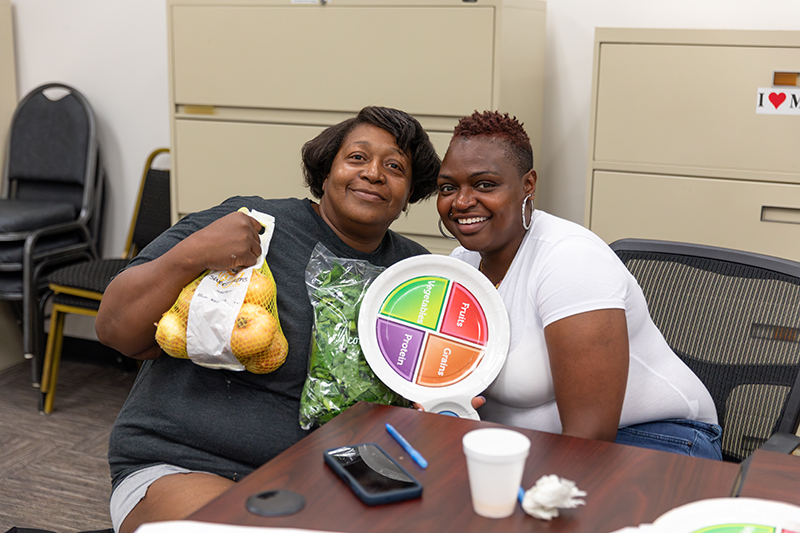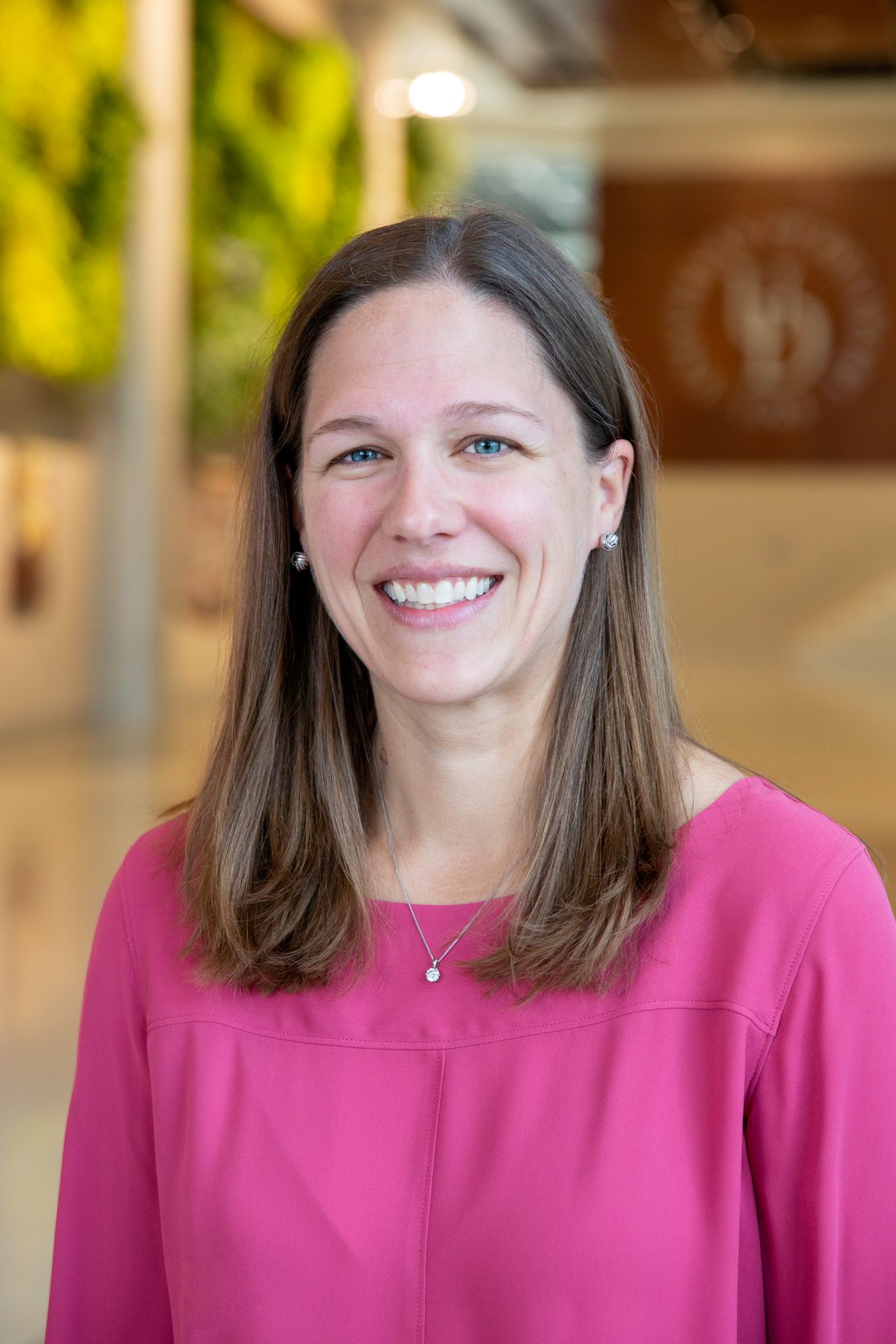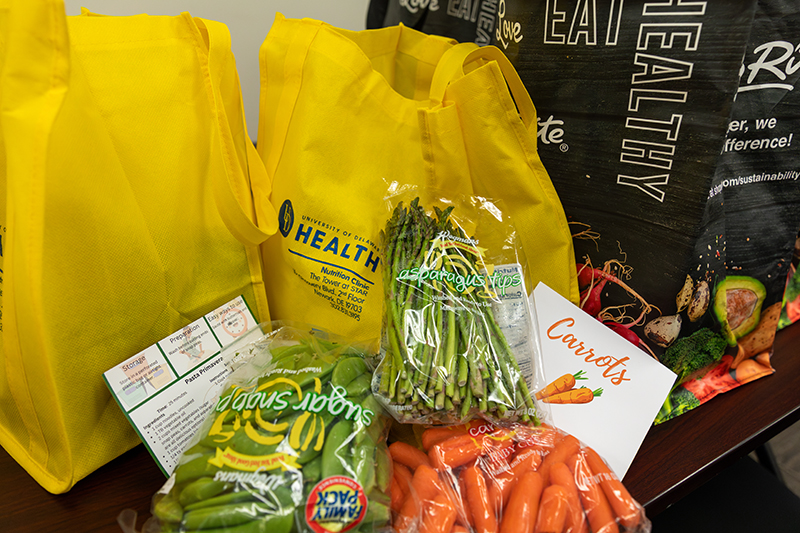


Food is Medicine
Photos by Ashley Barnas Larrimore August 12, 2024
UD pilots fruit, vegetable prescription program at Wilmington’s Horizon House
Before attending nutrition education counseling at Horizon House in Wilmington, Natisha Clanton ate fast food almost daily.
“I hated vegetables,” she said.
Felicia Lewis felt the same way.
“I didn’t like asparagus, squash or zucchini,” Lewis said. “But really, I had never tried them.”
Both participate in the University of Delaware’s fruit and vegetable prescription (FVRx) program, a proof of concept study conducted at Horizon House, which delivers integrated, community-based services to adults with mental health, developmental and intellectual disabilities and those experiencing homelessness. The FVRx program pairs nutrition education with the direct provision of fresh fruits and vegetables each week to individuals receiving services at Horizon House who have a chronic disease or are at risk for food insecurity. Led by UD Nutrition Clinic Director Donna Paulhamus and Shannon Robson, associate professor of health behavior and nutrition sciences in the College of Health Sciences, the study aims to address food insecurity as a social determinant of health.
“Those with mental health disabilities have substantially higher rates of food insecurity than those who don’t have a disability,” said Robson. “National data demonstrates individuals with a mental health disability are five times more likely to live in food insecure households compared to adults without a disability.”
Paulhamus has provided nutrition counseling on-site at Horizon House for the past four years through a contract with the Delaware Division of Substance Abuse and Mental Health (DSAMH).
“Many participants are profoundly affected by serious mental health conditions and have food insecurity that results in poor dietary intake, obesity, and increased risk for diet-related chronic diseases like diabetes and cardiovascular disease,” Paulhamus said.
It made for the perfect pairing to test implementing a FVRx program.
“This natural partnership builds upon the opportunity we have through the clinics to serve the public and connect with the community,” Robson said.

A novel approach
The FVRx study is based on the Food is Medicine approach championed by the Biden/Harris administration. It is funded through a generous donation from the College of Health Sciences’ Maggie E. Neumann Health Sciences Research Fund.
“We would not be doing this food-based intervention without our partnership with DSAMH and the Maggie Neumann funding,” said Paulhamus. “This funding has been integral to implementing the fruit and vegetable prescription program.”

The 34-week crossover study starts with a baseline health assessment. While all participants will receive fruits and vegetables, they will get them at different times.
“By the conclusion of the pilot study, we hope to understand whether their consumption increased and whether health parameters changed,” explained Robson.
Many FVRx programs provide vouchers. This study is unique because it allows for the direct provision of food.
“Transportation is one of the biggest barriers for this population, so vouchers likely wouldn’t be successful,” said Robson. “We’re also asking the participants what they like because research demonstrates when someone likes certain foods, they’re more likely to consume them.”
Early results, anecdotally, show it’s working.
“There was a lot of food I wouldn’t eat,” said Clanton. “Now, I’ll try anything. I eat blueberries and potatoes. I used to fry my cabbage in butter; now, I use olive oil. I’ve lost 27 lbs. and feel much better.”
Lewis has seen benefits from nutrition education counseling before getting her produce prescription.
“I used to say, ‘I don’t like that,’ but now eating healthier makes me feel good, and it makes me feel like I’m a part of something,” Lewis said. “I’ve been clean for four years now, and that’s beautiful, so to come here and work on my mental health and eat right has been great.”
A rare experience for students
Marisa Browne, a graduate student in the Master of Science in Nutrition and Dietetics/Dietetic Internship program, has been vital in administering the FVRx program. She orders the fruits and vegetables online, prepares weekly nutritional education classes, conducts baseline assessments, and delivers produce to participants as needed.
“This was a dream opportunity to be involved in research,” she said. “I love the idea of food as medicine, and I’ve learned so much by working in the community. There’s so much you can’t prepare for in the classroom, and it changes your perspective.”

Adriana Verdezoto Alvarado, a doctoral candidate in the Nutrition Science PhD program, has worked in the community before but never in this setting.
“Adjusting to meet their needs and understanding their living and food storage situations have been vital to helping them,” said Verdezoto Alvarado. “This intervention has opened my eyes to a different way of caring and helping people through health promotion.”
Paulhamus called this a rare learning opportunity for UD graduate students.
“Our students are learning how to work with different populations in the community and how to adapt nutrition interventions,” Paulhamus said. “This is a very vulnerable population that needs significant support. Community nutrition is popular, but nutrition-related education in substance abuse programs and people with significant mental illness isn’t typically a big focus, so many students don’t get this kind of opportunity.”
Eyeing expansion
The intervention was based on a need so great that the state had its eyes on expansion from the beginning. Jessica Ryan, deputy chief of social determinants for DSAMH, and Terry Cowan, a peer services administrator for DSAMH, sit on the steering committee and provide valuable insights that have been integral to the study’s design.
“There’s no fruit and vegetable program in the state of Delaware, so we appreciated the innovative approach to help address some of the nutritional needs of the population we’re serving,” said Ryan.
While the UD FVRx pilot study is still gathering data, Cowan, who provides a vital firsthand perspective, said a similar program helped him while in recovery a decade ago.
“UD students from a culinary arts program showed us how to shop for food and prepare it. They taught me what foods are beneficial and harmful to recovery,” Cowan said. “Most people in the populations we deal with don’t take care of themselves; they don’t realize the pivotal role that food and nutrition play in recovery and wellness.”
He called that continuum of care necessary.
“I needed to see tangible results. By not drinking caffeine or eating sugar before bed, I sleep better. Then, I wake up and feel better,” Cowan said. “Clinicians reinforced it and held me accountable.”
Ryan hopes to find additional funding sources to expand the program beyond the research phase.
“Our mission is to best service the community, meet their needs, break down barriers, and continuously grow in the resources and services we provide,” Ryan said. “We rely on integrated partnerships to best serve our clients, and this partnership with UD and Horizon House is a great collaboration we’d love to expand.”
Cowan highlighted the need for such programs statewide.
“The need is not just in New Castle County. In Kent and Sussex counties, the need is just as great, if not greater, and the obstacles and challenges are different.”
About the Fund
Maggie E. Neumann Health Sciences Research Fund was established in 2020 to support research designed to improve health and quality of life outcomes for children and adults with physical and developmental disabilities. While the fund resides at the College of Health Sciences, the intent is to support interdisciplinary research across all UD colleges.
The research fund was created with a gift from Donald J. Puglisi and Marichu C. Valencia in honor of their granddaughter, Maggie E. Neumann. Puglisi is a member of UD’s Board of Trustees, and they both serve on the President’s Leadership Council.
Contact Us
Have a UDaily story idea?
Contact us at ocm@udel.edu
Members of the press
Contact us at 302-831-NEWS or visit the Media Relations website

